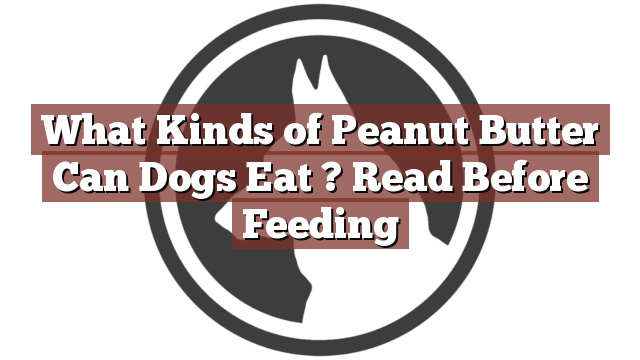Understanding Your Dog’s Dietary Needs
As responsible pet owners, it is essential to understand our dogs’ dietary needs to ensure their overall health and well-being. While dogs are primarily carnivorous, they can also benefit from certain human foods in moderation. However, not all human foods are safe for our four-legged friends. It is crucial to educate ourselves about what is appropriate for them to consume and what should be avoided.
What Kinds of Peanut Butter Can Dogs Eat? Read Before Feeding
One common question among dog owners is, "Can dogs eat peanut butter?" The answer is yes. Dogs can enjoy peanut butter as a tasty treat, and it can even have some health benefits. However, it is important to choose the right kind of peanut butter for your furry friend.
When selecting peanut butter for your dog, it is vital to avoid any varieties that contain xylitol, a sugar substitute that is toxic to dogs. Always check the ingredient list to ensure it does not include this harmful substance. Opt for natural or organic peanut butter instead, as it typically does not contain any added sugar or additives that can be harmful to your dog. Additionally, choose a peanut butter that is low in sodium to prevent any potential health issues.
Pros and Cons of Feeding Peanut Butter to Dogs
Feeding your dog peanut butter can have several benefits. It can be a great source of protein, healthy fats, and vitamins. Peanut butter is also a good source of niacin, vitamin B, and vitamin E, which can contribute to your dog’s overall well-being. It can be used as a training treat or as a way to administer medication, making it a versatile option for dog owners.
However, it is important to keep in mind some potential drawbacks of feeding peanut butter to dogs. Peanut butter is high in calories and fat, so it should be given in moderation. Excessive consumption can lead to weight gain and potential health issues like pancreatitis. Additionally, some dogs may have peanut allergies, so it is crucial to introduce peanut butter gradually and monitor your dog for any adverse reactions.
In Conclusion: Making an Informed Decision for Your Dog’s Health
In conclusion, dogs can safely enjoy peanut butter as a treat, as long as it is given in moderation and the right kind is chosen. Avoid peanut butter varieties that contain xylitol and opt for natural or organic options instead. Remember to check the ingredient list and keep an eye on the sodium content. While peanut butter can provide health benefits, it is essential to be mindful of the high calorie and fat content, as well as any potential allergies your dog may have.
When in doubt, it is always best to consult with your veterinarian before introducing any new food to your dog’s diet. They can provide personalized advice based on your dog’s specific needs and health conditions. By making informed decisions about your dog’s diet, you can ensure their overall well-being and keep them happy and healthy for years to come.
Thank you for taking the time to read through our exploration of [page_title]. As every dog lover knows, our furry friends have unique dietary needs and responses, often varying from one canine to another. This is why it's paramount to approach any changes in their diet with caution and knowledge.
Before introducing any new treats or making alterations to your dog's diet based on our insights, it's crucial to consult with a veterinarian about [page_title]. Their expertise ensures that the choices you make are well-suited to your particular pet's health and well-being.
Even seemingly harmless foods can sometimes lead to allergic reactions or digestive issues, which is why monitoring your dog after introducing any new food item is essential.
The content provided here on [page_title] is crafted with care, thorough research, and a genuine love for dogs. Nevertheless, it serves as a general guideline and should not be considered a substitute for professional veterinary advice.
Always prioritize the expert insights of your veterinarian, and remember that the health and happiness of your furry companion come first.
May your journey with your pet continue to be filled with joy, love, and safe culinary adventures. Happy reading, and even happier snacking for your canine friend!

